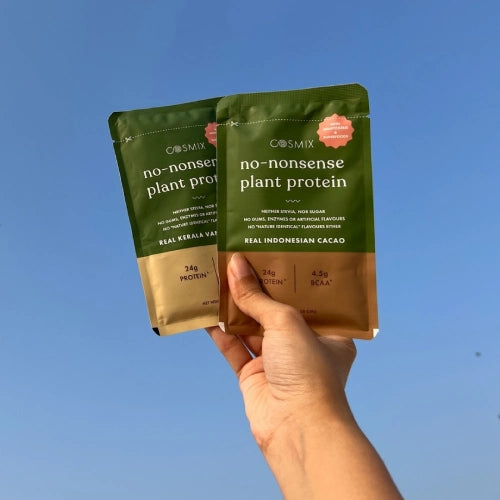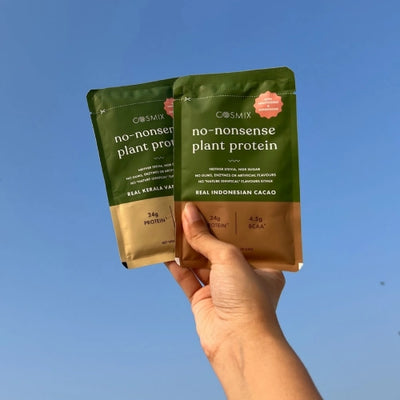Having spent years and years of our lives on a meandering journey through health has done one thing for sure: turned us into sceptics. We’ve gone from being immediately impressed with certain “cures” and “instant fixes” to our eyebrows rising all the way UP at the mention of supplements, treatments and magic pills. It’s ironic for a supplement brand, we know. But we would rather be in the business of being honest and share what we learn along the way, than over-promise and under deliver.
And that’s how we arrive at today’s topic of discussion: ADAPTOGENS. And how we went from curious to sceptical to convinced with more and more research.
Buckle up, awaken your inner nerd and get ready to dive right in.
Okay, what are adaptogens?
Adaptogens are herbal or plant-based pharmaceuticals known to combat the effects of stress in the body. Like the name suggests, adaptogens ‘adapt’ to your body’s current state, notice an imbalance or gaps in your body’s way of functioning optimally and fill those gaps. More on this in a bit.
First, a quick and interesting history fact to show you that adaptogens aren’t really a product of modern imagination.
The medicinal use of adaptogens go as far 3000 BCE, to the early days of Ayurveda in India and traditional medicine in China. Adaptogens continue to gain prominence among the Greeks, the Vikings and the Khanty people of Western Siberia till 1100 CE, until we arrive in 1948, in a post-World War Russia, where Soviet scientists begin researching certain herbs in search of the perfect solution to help pilots combat stress and fly better, faster and for longer periods of time and thus coining the term ‘adaptogens’. Eventually, research continued well into the 2000s, with more and more studies proving their effectiveness.

Woah! Sounds cool. How do they work?
Adaptogens function at a molecular level by bringing about a state of balance in hypothalamic, pituitary and adrenal glands aka the HPA Axis aka the glands involved in stress response. You can think of adaptogens as “stress hackers”. What does this mean?
Observe the cycle your body goes through when you’re under stress. First you’re alarmed, then you’re in a state of resistance i.e. your body is increasing your ability to focus and tackle the situation effectively, and finally, it all ends in a wave of exhaustion.
The sweet spot in the stress cycle is the one in the middle – where your focus is sharper, your senses are alert and all your concentration is on the issue at hand. Adaptogens enter and do the work of assisting your body in staying in that sweet spot for longer. They help us ride the wave longer and slowly ease into the next phase, rather than dramatically crash and burn.
Why is this important?
Get ready to travel back in time again. This time, all the way to the Stone Age. Our ancestors hunted other preys and predators. And a fight or flight response was especially important for survival in the wild. And as dramatic as the implications were, life was really simple back then: eat, sleep, hunt, repeat. So, the function of hormones like adrenaline and cortisol was quite controlled.
Now flash forward to current life. We’re under some kind of pressure ALL. THE. TIME. Be it that deadline at work, running out of toilet paper, surviving capitalism or personal drama. We’re pretty much in a fight or flight mode all day. The result? You spend more time in the alarm phase and the phase of exhaustion – this could also solve the mystery of why you feel tired all the time, even after getting 8 hours of sleep.
Cortisol is basically having an unchaperoned party in your body. And you need the party police i.e. Adaptogens to rein it in because:
-
Too much Cortisol is one of the main culprits of weight gain, especially in the belly area.
-
It affects your gut health, which in turn affects your body’s digestion. During stress response, cortisol aids in moving blood flow towards your brain, large muscles and limbs because your brain thinks you are in mortal peril, thus suppressing digestive functions. This is why someone who is always stressed has digestion issues like constipation, gas, bloating, acidity.
-
It won’t matter if you’re “eating right” if your body isn’t getting the chance to absorb these nutrients. And this in turns leads to nutritional deficiencies.
-
Remember – after the high of stress comes the crash of fatigue. Being in a constant state of stress means you’re in a constant state of fatigue too.
-
Too much cortisol sets off a domino effect of damage to immunity, hormonal balance, cognitive function and our internal clock.
And adaptogens help how exactly?
Like we mentioned earlier, adaptogens increase your body’s resistance to a stressor, thereby giving you ample time to slowly ease back to normal rather than crash straight into fatigue. It fills in the gaps in your system, and empowers you to soldier on until you reach a state of equilibrium.
That’s not all, some adaptogens can even help us ‘adapt’ to stress and cope with it better.
When your body is equipped to cope with stress, you automatically perform better, and are less prone to be stressed out easily, thus preserving your body’s stress response for far graver situations and limiting those cortisol parties in your body.
Directly, adaptogens help you calm down, improve your focus, energise you and create a state of balance between your internal and external environments.
Indirectly, it helps improve your sleep cycle, gut health, immunity, hormonal balance, chronic pain and other stress-related issues.

Woah! Where do I find some?
Some Indian adaptogenic herbs are: Holy Basil, Schisandra, Shilajit, Shatavari, Ashwagandha and even turmeric.
In addition, herbs like ginseng, rhodiola, astralagus, goji berries, mushrooms like Reishi and Cordyceps are also known to have adaptogenic properties.
The ancient Chinese went on expeditions to Siberia to find these adaptogenic herbs. The good news is, you have to do no such thing. You will find most of the abovementioned adaptogens in most of our mixes!
But the key takeaway we want you to have from this long read isn’t that we are your go-to place for adaptogens (which, we are). It’s this:
Your body’s primary job is to keep you alive. It cannot tell the difference between the stress of a deadline or actual danger to life. So when you stress out at even the smallest of inconveniences, it won’t know! And thus, being mindful of our response to these stimuli is essential to overall health and well-being.
You can find adaptogens in our mixes like Stress Me Not, All Day Energy, Sleep Like a Baby, and What Women Want.
And if you’re wondering where we got all this info from, check out these studies:
https://www.mdpi.com/1424-8247/3/1/188
https://www.healthline.com/health/cortisol-urine#uses
https://www.healthline.com/health/biological-rhythms#risk-factors
https://www.ncbi.nlm.nih.gov/pmc/articles/PMC3991026/
https://bmccomplementmedtherapies.biomedcentral.com/articles/10.1186/1472-6882-12-70
https://www.sciencedirect.com/science/article/abs/pii/S037887410800216X?via%3Dihub











